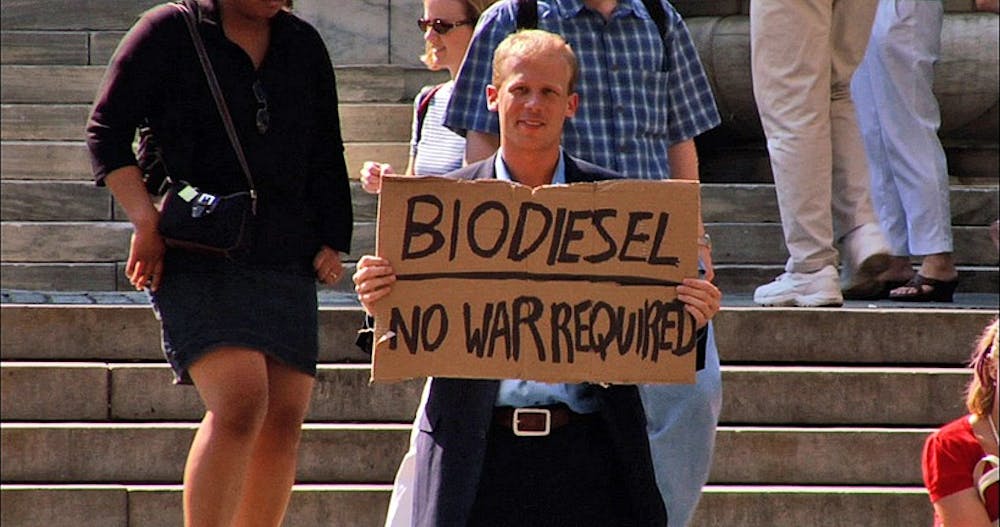Josh Tickell set off 11 years ago with a camera, his “Veggie Van” and a vision of helping influence America to begin using clean, renewable energy. This vision materialized in his new documentary, “FUEL.”
“I really made the documentary from a personal perspective because I grew up close to oil refineries, and I watched the pollution from those oil refineries make people sick, specifically my family members,” director Josh Tickell said. “I wanted to find a way to make energy that was clean. The movie really follows that personal quest seeking out and finding that kind of energy.”
Tickell’s personal experience, as well as the other stories about the negative impact the oil industry has had on their health, strongly portrays one of the major reasons the energy industry needs to change.
One of the most emotionally painful moments of the movie occurs when Tickell interviews people from Louisiana’s Cancer Alley, a place surrounded by oil refineries with uncommonly high cancer rates. Cancer alleys exist all over the world, located anywhere were these refineries are condensed into a small area.
Tickell’s own mother was affected by the pollution — she had nine miscarriages. Fertility rates often drop in cancer alleys and areas affected by heavy pollution. His mother’s is just one of the stories that fueled Tickell to make his documentary.
To film the documentary, Tickell traveled around the country in the “Veggie Van,” a diesel Winnebago decorated with painted sunflowers that runs entirely on bio-diesel.
“I wanted a way to travel the United States and really just do it cheaply and with as little environmental impact as possible,” Tickell said.
Tickell’s “Veggie Van” attracted a lot of attention on the road and even spurred talk show appearances. Seeing the quirky, bright van in the movie, often paralleled with upbeat, indie music about bio-diesel, brought a light-heartedness, feel-good fervor to the film.
“FUEL” changes tone halfway through the film, however, becoming more hopeful and focused on finding a solution to the energy problem and less on the awful things the oil companies have done.
Tickell said Katrina affected him in a way that changed his attitude toward the movie and compelled him to see large companies in a better light. “I’d always been under the assumption that energy companies were inherently evil, but what I realized during that experience is that every company is made up of people, and as people we have universal needs and desires,” he said. “One of those needs and desires is to have a safe and sustainable place to live.” This understanding, Tickell said, made him realize that any company can make a green shift.
Not long after this transformation, however, Tickell experienced a setback. After finishing his film and winning the Audience’s Award at the Sundance Film Festival in 2008, reports of bio-diesel actually being worse for the environment than oil surfaced. While the science shows that bio-diesel is better for the environment than oil, there are some types of bio-fuels that are better for the environment than others. Tickell redirected and re-cut parts of his film in order to include other types of sustainable energy and focus specifically on algae-based bio-fuel.
Tickell explained that because of the growing knowledge in the field, the film ended up changing quite a bit.
“The original vision was just about bio-diesel,” he said. “The end result now is about an ecology of solutions that when used together is more than the sum of the parts.” Today, Tickell and his crew are driving an Algaebus, which was inspired by the movie and gets 150 miles per gallon and runs on algae, he said.
According to the documentary, algae energy is one of the most environmentally friendly forms of bio-fuel, as it does not emit any carbon into the air.
“Algae is the fastest replicating organism on earth,” Tickell said. “It’s also the most efficient converter of sunlight into hydrocarbons. If you’re going to grow fuel, you might as well grow it with something that’s exceptionally efficient, and algae fits that bill. It also provides a way to grow fuel in places that don’t compete with food supply.”
To kick off the movie, Tickell and 11 others went on a tour across America in six environmentally-friendly vehicles. During this tour, they received some unexpected support.
“We had the Republican governor of Nevada put fuel in the algae car,” Tickell said. “That was unexpected. We’ve had just an incredible outpouring of support from people who are politically powerful.”
Tickell’s promotion for the green movement and his new documentary is not ending with the tour. The Veggie Van Organization, run by Tickell and his producer/fiancée, Rebecca Harrell, is finishing up developing a green curriculum for schools.
“It will be ready for use in classrooms at the end of this month,” Harrell said. “It has seven modules. It’s based on the green barrel that’s featured at the end of the movie ‘FUEL.’ [The modules are] energy efficiency, public transportation, wind, solar, biomass and sustainable biofuels and electric vehicles [and] plug-in hybrids. Each one of those is now a module that meets national education standards, and we’re distributing it for free to classrooms along with a free 35-minute educational version of the movie ‘FUEL.’”
You can reach this writer at thescene@theeagleonline.com.





